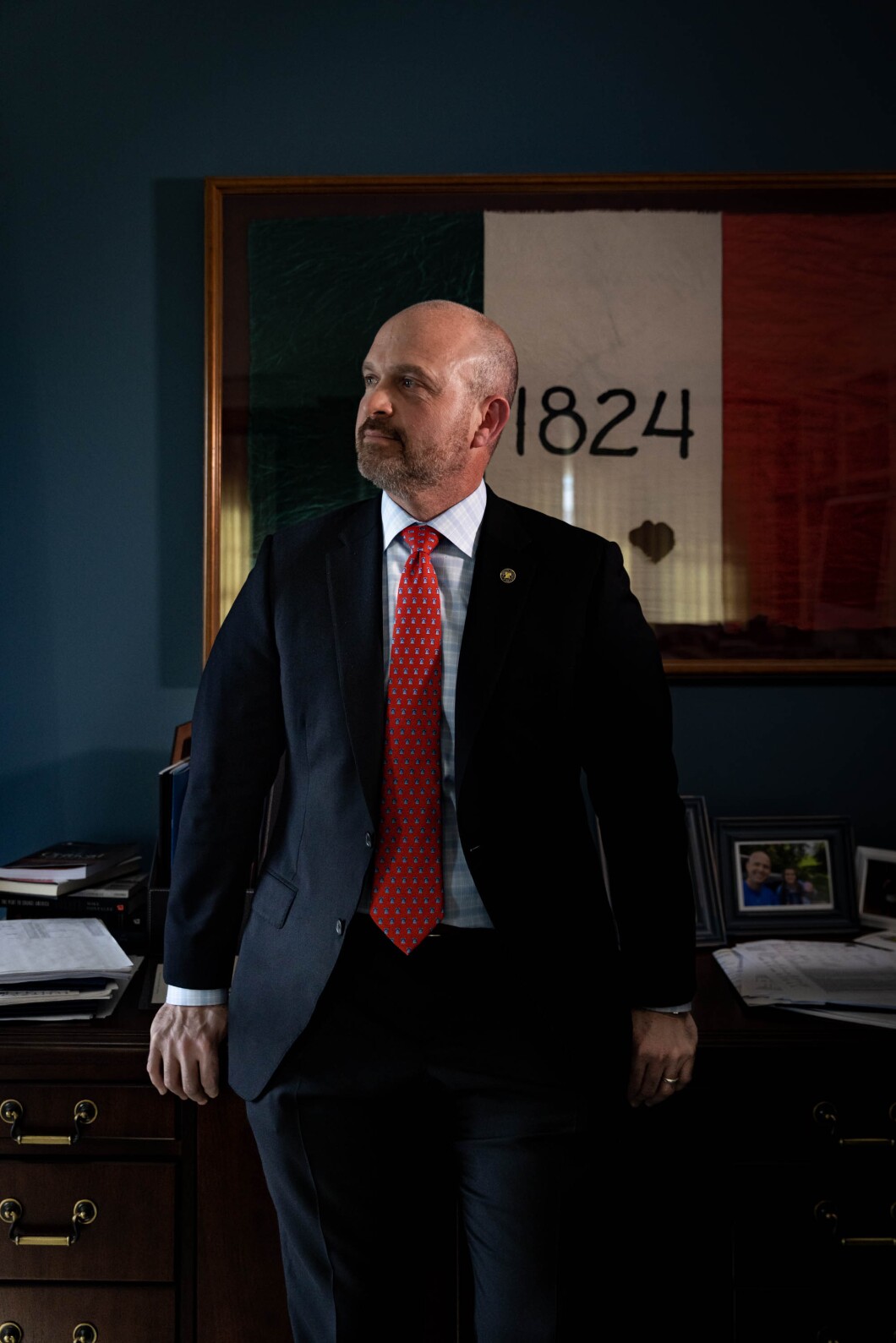
The most important conservative think tank in the United States is now 50 years old. The half-century mark is not the only chronological milestone on the Heritage Foundation president’s mind, however.
“But I think what people need to understand about Heritage in the next 50 years is that we know what time it is,” Kevin Roberts told the Washington Examiner during a wide-ranging interview in his office overlooking Union Station in Washington, D.C.
VANCE RAILWAY SAFETY BILL TESTS MORE POPULIST, BLUE-COLLAR GOP
That time clearly isn’t morning in America, the signature phrase in Ronald Reagan’s 1984 reelection campaign ad. All those years ago, Heritage helped equip the intellectual arsenal that armed the foot soldiers of the Reagan Revolution. Reagan went on to win a second term in a 49-state landslide with nearly 60% of the popular vote, coming within one vote per precinct in Walter Mondale’s Minnesota of making it a 50-state sweep. In Heritage’s backyard, Washington, D.C., still gave Mondale 85% of the vote.

Grassroots conservatives aren’t in quite as sunny a mood nearly 30 years later as another presidential election beckons. Former President Donald Trump, who is seeking to become the first commander in chief to win nonconsecutive terms since Grover Cleveland, was better known for his so-called American Carnage speech, blasting global elites, cultural and economic decline, unguarded borders, endless wars, and rising violent crime.
The contrast between Reagan’s and Trump’s electoral track records doesn’t exactly fill rank-and-file conservatives with Reaganite optimism. In contrast with the national consensus that was available to Reagan, and to Richard Nixon a dozen years before him, Trump was barely elected by less than 80,000 votes in the key battleground states. He lost his bid for a second consecutive term by 43,000 votes in three states, coming in second in the cumulative national popular vote both times.
Whether this reflects the superiority of Reagan’s political approach to Trump’s or the fact that conservatives have for a variety of reasons lost ground since the 1980s is a matter of debate, especially on the Right. Roberts and Heritage are not preoccupied with the crude electoral math, but navigating the intraconservative discussions now taking place concerns him very much.
“The last 50 years of Heritage mirror the last 50 years of the conservative movement,” the 48-year-old Roberts said. “And they’re both successes as well.”
Among the tasks facing Roberts is to maintain continuity with the Reaganite and pre-Reaganite roots of the institution while updating for a new era in the conservative movement. A decade ago, Sen. Mike Lee (R-UT) opened his What’s Next for Conservatives? address by noting that by the time the 2016 election rolled around, Reagan’s first election would be as far in the past as D-Day was in 1980. The venue for Lee’s speech was the Heritage Foundation.

“Progressives have become the party of Wall Street, K Street, and Pennsylvania Avenue,” Lee said at the time. “We must become the party of Main Street, everywhere.”
That is a common refrain among those who like to see a “conservative realignment,” in which social conservatives become a bigger part of the “three-legged stool” of the GOP coalition that also includes economic and national security conservatives. At an intellectual level, they argue that fusionism — the contention by National Review senior editor Frank Meyer that authentic American conservatism values both liberty and virtue, seeking to manage the tensions between these two goods — tipped the balance much too far in the direction of liberty.
Another power center on the Right rivaling the fusionists is the burgeoning national conservatism movement, led in part by Yoram Hazony, an Israeli American political theorist who authored the influential 2018 book The Virtue of Nationalism. National Conservatism Conferences have been held in Washington, D.C., Miami, London, and Brussels, attracting sitting senators as speakers.
United to some degree by the desire to see the defense of the nation-state loom larger in conservatism, creating a cohesive political project beyond that has proved challenging. The inaugural summit featured keynote addresses by both Fox News host Tucker Carlson, who recently said Trump’s “grasp of foreign policy” and “understanding of world affairs” is “so much more nuanced and sophisticated and pro-American than the moronic neocons currently in charge,” and former Trump national security adviser John Bolton, who was sacked over his foreign policy disagreements with the boss.
“I actually like the phrase ‘conservative realignment,’” Roberts said. “You know, there are some on the Right who like to use the more pejorative description of the ‘dead consensus.’ And I understand where they’re coming from and, for that matter, even agree with some of their critiques.” But he isn’t quite as willing to embrace their eagerness to use federal power for traditionalist ends.
“What I inherited, and what I’ve tried to inject into that particular part of the movement, is a reminder that federal action isn’t the answer,” Roberts said. “Most of the time, that if in fact we’re going to encourage the state, that is the government, to take action, it needs to begin at the state level.”
China is one area where Roberts might go further. “We need to use every ounce of state power, every ounce of federal power, to eliminate the Chinese from our economy,” he told syndicated columnist and Modern Age editor Daniel McCarthy. But even that is not necessarily a radical departure from Cold War conservatism.
“We have got to accept Big Government for the duration — for neither an offensive nor a defensive war can be waged, given our present government skills, except through the instrument of a totalitarian bureaucracy within our shores,” William F. Buckley Jr. wrote in Commonweal magazine in 1952. “And if they deem Soviet power a menace to our freedom (as I happen to), they will have to support large armies and air forces, atomic energy, central intelligence, war production boards, and the attendant centralization of power in Washington — even with Truman at the reins of it all.”
Roberts referred to a 2019 essay published in the religious conservative journal First Things and signed by 15 conservative writers titled “Against the Dead Consensus,” which was clearly a shot across the Reaganite bow. It came as prominent voices on the New Right — the new New Right, that is, not the old 1970s version — have made more stinging critiques of what they call “Zombie Reaganism,” maintaining that the conservative movement of their elders actually conserved little of consequence.
“Yes, the old conservative consensus paid lip service to traditional values,” they wrote. “But it failed to retard, much less reverse, the eclipse of permanent truths, family stability, communal solidarity, and much else. It surrendered to the pornographization of daily life, to the culture of death, to the cult of competitiveness. It too often bowed to a poisonous and censorious multiculturalism.”
“And we respectfully decline to join with those who would resurrect warmed-over Reaganism and foreclose honest debate,” they concluded.
This talk isn’t confined to the pages of magazines and the offices of think tanks. Sen. J.D. Vance (R-OH) was recently elected as a critic of what he describes as libertarianism’s excessive influence on conservative economics and domestic policy. A Trump associate was quoted in the press calling Gov. Ron DeSantis (R-FL) a “Reaganite” and meaning it as an insult as part of a 2024 campaign strategy assailing the governor for his support for entitlement reforms as a member of Congress.
Roberts, by contrast, is “still a Reaganite.” But he again said that the best way to be one is to “recognize the time we’re in. And the time we’re in is one where history may rhyme.”
“But I would like to think if President Reagan, who remains a hero of mine, was sitting here right now, he would say, ‘It’s 2023, Roberts,’” he said. “We had more money in 1983. We had a much more cohesive culture. We had a much more patriotic country.”
That perceived loss of national pride and identity has been an animating concern of Trump-era conservatism. The former and perhaps future president was complaining about elites with questionable loyalty to their fellow citizens way back when Reagan was in the Oval Office. Trump made borders, sovereignty, and protecting or restoring the U.S. manufacturing base major parts of his campaign platform, to the irritation of some avowed Reagan disciples.
“In fact, I think he would be shocked by how much [some have] denigrated patriotism,” Roberts said of Reagan. “And so what are you, the conservative movement, going to do about it? And I, to an extent that someone thinks that we need to be responding to Reagan’s question, I happen to think we do so as a Reaganite. I think Heritage is very much on that path to doing so. … We have to be as comfortable asking the tough questions.”
Roberts is used to asking questions. An academic by background, he received his doctorate in American history from the University of Texas. He taught at the college level, founded the K-12 John Paul the Great Academy in Louisiana, and served as president of Wyoming Catholic College.
But Roberts came to Heritage in October 2021 from the Texas Public Policy Foundation. That may influence his penchant for state-based policy solutions. “Coming from a state as free and prosperous as Texas, I’m eager to share the innovative ideas we developed and build on them,” Roberts said in a statement upon becoming Heritage’s seventh president. Yet he also opened the Austin-based nonprofit organization’s first D.C. office.
“He has upheld the core principles of the Heritage Foundation while at the same time repositioning the organization to fight the challenges of today like monopoly power in the tech industry, economic competition with China, and cultural radicalism in public schools,” said Johnny Burtka, president of the Intercollegiate Studies Institute. “Most importantly, he’s a nice guy who is willing to invest time and energy in young people. He’s confident but approachable and unpretentious. I couldn’t think of a better person to lead the Heritage Foundation and America in 2023 and beyond.”
Roberts isn’t the first Heritage president to try to navigate changing currents on the Right. Former Sen. Jim DeMint (R-SC) left Congress in 2012 to lead the think tank in a period of time that stretched from the “libertarian moment” to the beginning of the Trump administration, trying to make peace with both. It ended with DeMint’s ouster in 2017.
“That was really about management and how to balance activism with ideas,” a former Heritage staffer said. “Kevin’s challenge is going to be keeping the ideas fresh.” Roberts described Heritage as a “solutions factory” upon taking the job.
“DeMint came from the world of politics,” a Republican strategist said. “Roberts comes from the world of ideas.”
Heritage’s 50th anniversary events brimmed with both. There was talk of reducing the growth of federal spending and regulation, as well as protecting unborn children and promoting family formation. Preparing the next conservative president has always been part of Heritage’s mission. Some possibilities were among the speakers: Sen. Tim Scott (R-SC), who has already launched an exploratory committee; DeSantis, the main Trump competitor in the polls who is expected to make a 2024 decision at the conclusion of the Florida legislative session next month; and Gov. Glenn Youngkin (R-VA).
There were also other topics that wouldn’t have been on the agenda in the 1980s. One was holding Big Tech accountable, a cutting-edge debate among conservatives. China occupies a place where one might have found the Soviet Union. Carlson was tapped as the keynote speaker.
“Kevin is the real deal,” Burtka told the Washington Examiner. “He knows ‘what time it is’ in America and has a profound understanding of the civilizational crisis facing the nation, in addition to the economic and national security ones, which is rare for the head of a major D.C. think tank.”
So what time is it? “To take back our country,” Roberts replied, “from people who’ve instituted a two-tiered system of justice, who as we sit here are implementing a two-tiered banking system.”
Roberts makes arguments that are distinctly in line with the Trump-DeSantis conservative mood.
“I can hate my government and love my country,” he said. “I can hate a government that jails people illegally. I can hate a D.C. local government, which has the money and ability to allow impoverished black Americans to go to the school of their parents’ choice, disallowing them to do that. I can find it very problematic that the first African American president was actually the initiator of killing that program and still love my country.”
CLICK HERE TO READ MORE IN THE WASHINGTON EXAMINER
If that doesn’t sound like morning in America, you may also know what time it is.
“It’s not morning in America,” Roberts said. “It’s a sunset. The sun is still there. My chief of staff knows I love beautiful sunsets. There’s some sun left on the horizon, but not much.”
W. James Antle III is the Washington Examiner’s politics editor.




